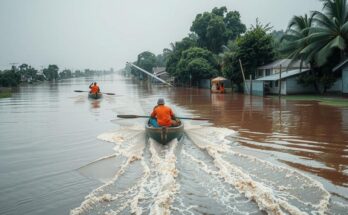Persons with disabilities face heightened vulnerability during climate change-related disasters, with a significant portion of this community living in regions most affected by climate crises. The lack of inclusive emergency response systems and decision-making platforms exacerbates their challenges. Advocacy efforts, particularly from leaders like Amina Audu, are crucial for ensuring their voices are heard in climate discussions. Collaborative initiatives focused on research and community empowerment are essential for developing sustainable solutions that address the needs of disabled individuals.
The climate crisis disproportionately impacts individuals with disabilities, significantly exacerbating their risks during environmental disasters. On December 3, recognized as the International Day of Persons with Disabilities, the complexities faced by this group should be highlighted. For instance, a wheelchair-bound person in Florida facing Hurricane Helene or a legally blind individual in Nigeria amidst severe flooding faces unique challenges. With over 1.3 billion people, or 16% of the global population, living with disabilities, it is crucial to recognize their plight during climate emergencies.
Amina Audu, a Nigerian disability activist, emphasizes that 80% of people with disabilities reside in the global south, making them particularly vulnerable to catastrophic climate events. People with physical disabilities often struggle with heat regulation, which can exacerbate health challenges. Furthermore, during climate emergencies, individuals with disabilities frequently lack access to essential medical care, exacerbating their risk of mortality during such events, with studies suggesting they are two to four times more likely to perish in these circumstances.
Moreover, chronic illness increases one’s susceptibility to climate impacts. Conditions like asthma and diabetes, compounded by high temperatures, can lead to serious health declines. Dr. Kimberly Humphrey, an Australian emergency physician, explains how interactions between heat and medication can render treatments ineffective, thus endangering affected individuals. Unfortunately, public emergency response systems typically fail to accommodate those with disabilities, further worsening their condition during climate crises.
Individuals with disabilities are often excluded from climate change discussions, diminishing the visibility of their needs in policymaking. Amina Audu has actively sought a formal voice for persons with disabilities in international climate conferences, arguing that disability perspectives must inform climate initiatives. Initiatives like the Rebuilding Hope on Wheels Initiative, founded by Amina, aim to empower disabled individuals in Nigeria to advocate for their rights and contribute solutions to climate challenges, thereby fostering resilience in their communities.
Collaborative efforts are underway in Nigeria to investigate the intersection of climate change and disability. Health professionals, like Professor Adesola Odole, are taking significant steps to incorporate disability considerations into health discussions. The growing involvement of young advocates is seen as key to driving change and amplifying the voices of persons with disabilities in climate advocacy.
In light of the upcoming Global Disabilities Summit in Berlin, the commitment to inclusive development is essential in ensuring persons with disabilities are not merely an afterthought in discussions surrounding climate change. The slogan “Nothing Without Us” underscores the urgency of integrating disability perspectives in all climate-related dialogues, asserting that this inclusion is essential for equitable societal progression.
To achieve meaningful policy changes, it is imperative that leaders prioritize the issues faced by persons with disabilities and ensure that their contributions are recognized in climate adaptation and broader development initiatives.
The intersection of disability and climate change has become an increasingly pressing issue as global environmental crises escalate. Individuals with disabilities represent a significant portion of the global population, facing unique vulnerabilities during climate-related disasters. The reality is that climate change tends to disproportionately impact these individuals, highlighting a critical need for inclusive climate policies and emergency response systems. The advocacy of individuals such as Amina Audu, alongside various health professionals and organizations, is pivotal in advocating for the inclusion and representation of disabled persons in climate discussions and solutions.
To foster equitable and inclusive responses to climate change, it is crucial to recognize the unique challenges faced by persons with disabilities. Their voices and perspectives should be integral to climate initiatives to ensure that actions taken are comprehensive and representative. Collaborative efforts at both the grassroots and international levels, particularly leading up to events like the Global Disabilities Summit, are vital in driving this change and promoting an inclusive future for all individuals affected by the climate crisis.
Original Source: www.globalcitizen.org




